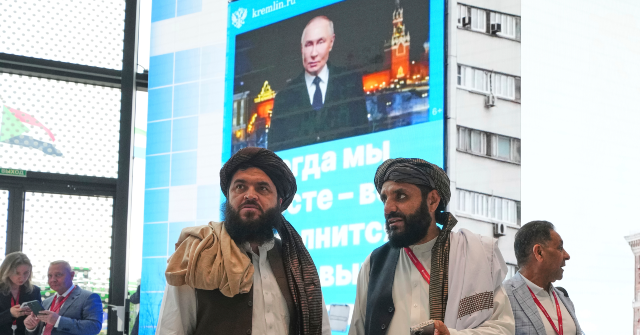Russia’s special representative for Afghanistan, Zamir Kabulov, celebrated the advancement in bilateral relations, reportedly describing the Taliban’s Afghanistan as a Russian “ally” and praising the Taliban for allegedly helping to contain the threat of other terrorist organizations in Afghanistan since it returned to power in August 2021.
Hassan’s installment as ambassador to Moscow was made possible by years of negotiations between the Taliban and the regime of strongman Vladimir Putin, whose country had endured decades of struggle against the Taliban long before the events in 2001 that led to the now temporary end of their rule in Afghanistan. The Taliban, a Sunni jihadist terror organization, returned to power in Kabul after former American President Joe Biden announced in 2021 that he would violate an agreement made during the term of his predecessor and successor, President Donald Trump, with the group for the withdrawal of American troops by May of that year.
Biden extended the 20-year Afghan war for America by rescheduling the withdrawal of troops into September of that year, prompting the Taliban to initiate a full-scale assault on the U.S.-backed government of the country that ended with the collapse of its armed forces and then-President Ashraf Ghani fleeing the country on August 15, 2021.
No country has formally accepted the Taliban, which calls itself the “Islamic Emirate of Afghanistan,” as the government of that country. The United Nations allowed for collaboration with the Taliban in a 2022 resolution calling for working with “all relevant Afghan political actors” that did not name the Taliban. Many of Afghanistan’s neighbors — prominently including Iran, China, Russia, and Pakistan — have also engaged with the Taliban without formally accepting its legitimacy, instead referring to it as an “interim” ruling entity despite any movement towards a change in regime or national elections.
Russia faced an added obstacle to its neighbors in working with the Taliban: its government had declared the group a foreign terrorist organization in 2003, outlawing any contact. After a years-long process to first enact a law that allowed for removing such groups from the terror list and then actually delist the Taliban, Moscow announced in April that it would no longer recognize the Taliban’s jihadis as terrorists.
The move allowed for Hassan to take on his role as ambassador on Tuesday.
“Mawlawi Gul Hassan Hassan, the ambassador and special representative of the Islamic Emirate of Afghanistan in Russia, officially began his duties by holding an introductory meeting with embassy staff,” Taliban “foreign ministry” public relations chief Zia Ahmad Takal said this week, according to a report by Afghanistan’s Tolo News on Wednesday. “In this meeting with diplomats and staff, he stated that he would carry out the embassy’s affairs with full commitment and in complete cooperation with the staff and in accordance with his responsibilities.”
The official statement from the Taliban “foreign ministry” described the return of an ambassador for Afghanistan to Russia as an “important development” that it expected would “further broaden and strengthen relations between the two countries in political, economic, and other domains.”
Kabulov, speaking with the Russian news agency Tass, stated that Russia and the Taliban have “good coordination in ensuring security” and described the Taliban as an “ally of Russia in the fight against international terrorism.”
“In this particular case, they [the Taliban authorities] are our objective allies, whom we must support in order to arm them in every sense of the word, so that they successfully suppress all these smallest hotbeds of international terrorism,” he stated, citing the Taliban’s ongoing conflict with the Islamic State, which has conducted terrorist attacks in Russia, as an example of evidence that Russia can trust the Taliban on terrorism.
In other comments to Tass, Kabulov encouraged the government of the United States to free frozen Afghan government funds to the Taliban to help the totalitarian jihadists implement their political vision for the country.
“We drew attention to the fact that Afghan problems cannot be solved by meetings, conferences and so on. Afghans need concrete assistance, not promises and analysis of existing problems,” Kabulov said of meetings he attended this week in Doha, Qatar, regarding the future of Afghanistan.
The Russian special envoy reportedly specified $10 billion in frozen Afghan assets under American auspices that he hoped to see rapidly released to the Taliban.
The Taliban has increased its fundraising efforts in the past year as it faces a growing surge of repatriations from its neighbors, particularly Iran and Pakistan. Taliban officials estimated in early June that as many as 5 million Afghans had been returned home since August 2021, a number that grew significantly after Pakistan ordered the deportation or self-removal of nearly 2 million Afghans in late 2023. Iranian media cited local border officials this week stating that they were seeing 8,000 repatriations to Afghanistan a day.
Taliban “foreign minister” Mawlavi Amir Khan Muttaqi met with a senior Red Cross official on Wednesday and “called on all international charitable organizations and institutions, including the International Red Crescent Society, to support the needs of Afghans.” The Taliban-run Bakhtar News Agency reported that Muttaqi cited the deportations as a particular problem worsening the humanitarian situation under the Taliban.
Follow Frances Martel on Facebook and Twitter.
Breitbart News
Read the full article .


